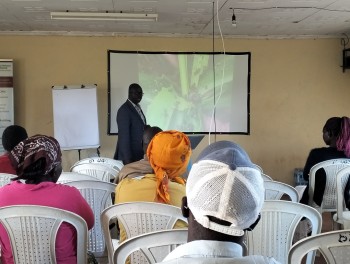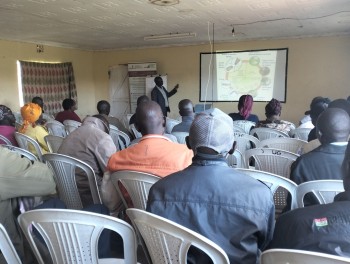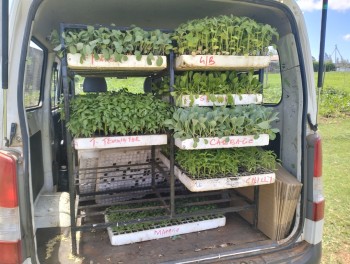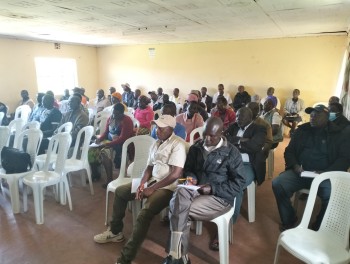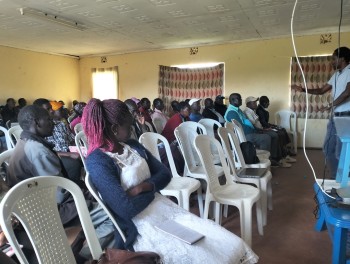The University of Eldoret, Outreach and International Students’ Centre (OISC) in collaboration with the Department of Agriculture, Uasin Gishu County successfully carried out a farmers’ training on ‘Major Pests and Diseases’ in Moiben Sub County. This off-station training was held at Meibeki Chiefs’ Office, Karona-Meibeki Ward, Moiben Sub-County on Wednesday, 25th May 2023 in response to the needs of the farmers in the Ward as requested through the Ward Agricultural Officer (WAO). The total number of participants was 70 including the Ward Agricultural Officer, Chief (Meibeki Location) and members of staff from UOE led by Dr. Daniel Chebet and Dr. Heka Kamau.
The Ward Agricultural Officer, Mr. Emmanuel Kurui was instrumental in mobilization of farmers and organizing the training venue. He welcomed the University team to the venue and introduced them to the farmers. Dr. Heka Kamau briefed the participants about the University of Eldoret and the Outreach Centre’s roles, objectives and activities.
The training focused on the following pests and diseases:
Pests:
- Fall armyworms in maize,
- Leaf minor (Tuta absoluta) in tomatoes,
- False codling moths in capsicums and oranges,
- Mealy bugs in oranges,
- Diamondback moths in cabbages and kales and
- Fruit flies in tomatoes and oranges.
Diseases:
- Fusarium wilt in passion fruits,
- Dieback disease complex in passion fruits and
- Citrus greening in oranges
The focus of the discussion was on the identification, signs, and symptoms of the pests and diseases, their life cycles, and control measures. What emerged from the discussions was that the farmers are well versed with chemical control measures but not in the non-chemical control measures. They were informed that chemical controls are expensive, not entirely successful, and are an environmental and health hazard. Emphasis was laid on non-chemical control measures which included the following:
- Crop rotation to break the pest cycle
- Field hygiene – collection and disposal of infected materials and crop debris by burning or burying them deeply
- Keeping the fields weed-free
- Cleaning all farm tools, equipment, and machinery after use. This includes vehicles and tractor-trailers
- Intercropping the main crops with trap crops
- Biological control with pheromone traps
The Ward Agricultural Officer, the area Chief, and the farmers appreciated the University for the training and requested for further training on Horticultural Production in September 2023 since it is the tomato planting season in the area. They also identified Soil Testing and fertilizer use as other areas of interest for training.

